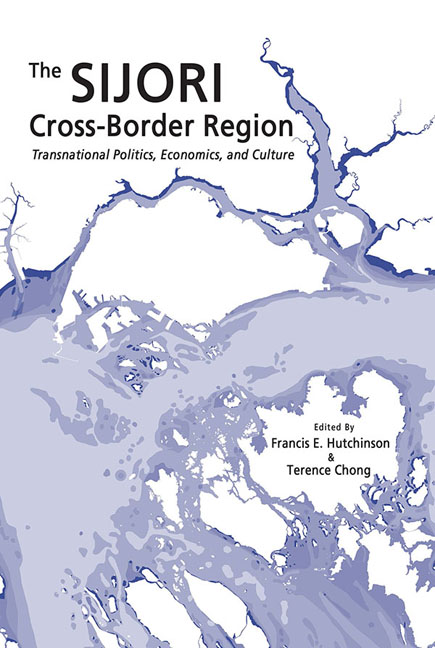Book contents
- Frontmatter
- Contents
- List of Maps
- List of Tables
- List of Figures
- Foreword
- Acknowledgements
- Contributors
- Abbreviations
- Introduction
- Section I Understanding the Whole
- Section II Policy and Politics
- Section III Cross-Border Social and Cultural Communities
- Section IV Formal and Informal Economies
- Map5
- 13 The Airport and the Territory: Transnational Flows in the Singapore- Johor-Riau Cross-Border Region
- 14 Revisiting Industrial Dynamics in the SIJORI Cross-Border Region: The Electronics Industry Twenty Years On
- 15 Development in Johor and Singapore's Water Access: Challenges and Opportunities
- 16 The Role of Ethnic Chinese Business Networks in the Regionalization Strategy of Singaporean Fish Farming Firms
- 17 Pirates and Law Enforcement Agencies: Complex Relations Across the Malacca Straits
- Conclusion
- Appendix
- Sources for the SIJORI Maps
- Index
13 - The Airport and the Territory: Transnational Flows in the Singapore- Johor-Riau Cross-Border Region
from Section IV - Formal and Informal Economies
Published online by Cambridge University Press: 22 July 2017
- Frontmatter
- Contents
- List of Maps
- List of Tables
- List of Figures
- Foreword
- Acknowledgements
- Contributors
- Abbreviations
- Introduction
- Section I Understanding the Whole
- Section II Policy and Politics
- Section III Cross-Border Social and Cultural Communities
- Section IV Formal and Informal Economies
- Map5
- 13 The Airport and the Territory: Transnational Flows in the Singapore- Johor-Riau Cross-Border Region
- 14 Revisiting Industrial Dynamics in the SIJORI Cross-Border Region: The Electronics Industry Twenty Years On
- 15 Development in Johor and Singapore's Water Access: Challenges and Opportunities
- 16 The Role of Ethnic Chinese Business Networks in the Regionalization Strategy of Singaporean Fish Farming Firms
- 17 Pirates and Law Enforcement Agencies: Complex Relations Across the Malacca Straits
- Conclusion
- Appendix
- Sources for the SIJORI Maps
- Index
Summary
INTRODUCTION
Singapore's air-traffic has grown at an astounding rate: the number of passengers has quintupled since Changi Airport opened in 1981 and tonnes of airfreight movements have risen by a factor of ten. In great part, the increase of flows articulated by Changi has been central not only for the development of Singapore but also — as this chapter argues — to the growth of its related larger territory: the Singapore-Johor-Riau (SIJORI) Cross-Border Region (CBR). Through fieldwork conducted in Singapore, the State of Johor in Malaysia and the island of Batam in Indonesia, this chapter outlines an ongoing investigation into the impact and potential that “aeromobilities” have on processes of urbanization and regional integration within this wider region.
Specifically, the chapter explores the air-cargo networks articulated by Changi throughout this larger territory. It analyses the spatial manifestations and implications for cross-border regulatory regimes shown in two case studies: (1) the trade of taxfree “perishable” goods, such as fresh cut flowers and ornamental fish organized by local small and medium enterprises (SMEs) across SIJORI's rural hinterlands; and (2) the offshore production of “high-value” electronics by multinational corporations (MNCs) and their transhipment between Changi and the industrial free-trade zones of the SIJORI region. In doing so the research uncovers how, in playing both active and reactionary roles in urban development beyond Singapore's national borders, Changi Airport has enabled companies to expand their commercial activities across the SIJORI Cross-Border Region.
Finally the chapter investigates the development of “low-cost” hybrid trans-border air-and-bus and air-and-ferries combinations put in place by SIJORI's secondary airports — namely Hang Nadim in Batam and Senai in Johor. While Changi remains the international hub, overshadowing by its capacity and connections the smaller airports on the fringe, these are starting to develop inventive solutions to compete with Changi. In doing so, the chapter argues that coming changes in Singapore's airspace control, coupled with the rapid development of aviation in the region, calls for Changi's hub to expand its catchment area even further across national borders by collaborating with these smaller regional airports.
In conclusion, the paper posits that Changi Airport, along with its related transport links, is a critical lens for re-examining and broadening Singapore's cross-border perspective and questioning how this larger territory is being redesigned to facilitate the production as well as global circulation of goods and passengers.
- Type
- Chapter
- Information
- The SIJORI Cross-Border RegionTransnational Politics, Economics, and Culture, pp. 341 - 369Publisher: ISEAS–Yusof Ishak InstitutePrint publication year: 2016



